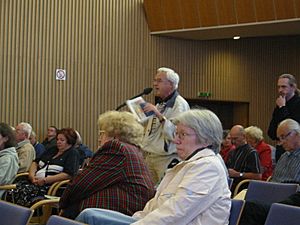Argument facts for kids
An argument is a way to convince someone about an idea. When you make an argument, you give reasons to show why your idea is right. In everyday talk, an argument usually has a main idea, called a conclusion, and facts or reasons, called premises, that support it.
Contents
What is an Argument?
An argument is like giving a good reason to support your opinion or belief. It's not about fighting or disagreeing loudly. Instead, it's about using logic and facts to explain your point of view.
Why Do We Use Arguments?
People use arguments all the time. For example, you might argue why your favorite sports team is the best. Or, in a classroom, you might argue why a certain historical event happened. In politics, people make arguments to explain why their ideas for society are good. The whole process of making and discussing arguments is called argumentation.
Strong and Weak Arguments
- A strong argument gives very good reasons that make sense. It helps people agree with your conclusion.
- A weak argument does not have good reasons. It might not convince anyone.
Valid and Invalid Arguments
Arguments can also be called valid or invalid.
- A valid argument means that if all the reasons (premises) are true, then the main idea (conclusion) must also be true. It follows a correct logical path.
- An invalid argument means that even if the reasons are true, the main idea doesn't necessarily have to be true. The logic doesn't quite connect.
Sometimes, an argument might sound good at first, but it can actually be tricky or wrong. These are often called fallacies.
Related Pages
See also
 In Spanish: Argumento para niños
In Spanish: Argumento para niños


